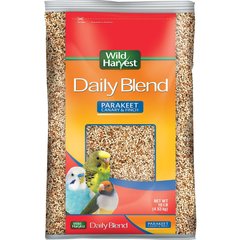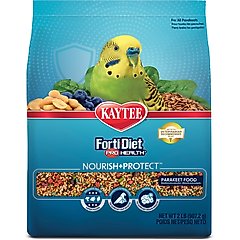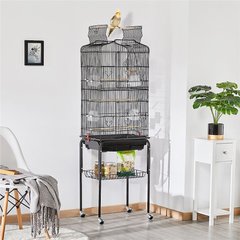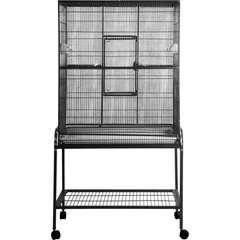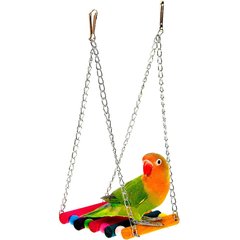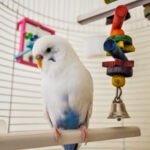Parakeet Care 101: How To Take Care of a Parakeet
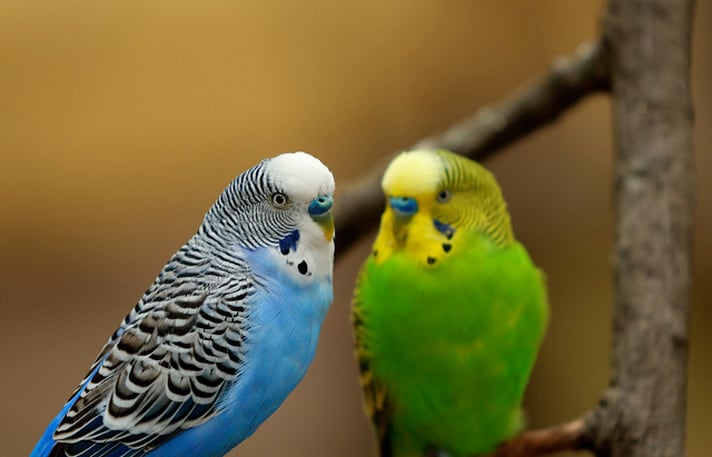
Photo by Chewy
So, you’re thinking about bringing a parakeet into your life. And, like any responsible pet parent, you want to learn everything you can about your new feathered friend before adding them to your family.
Parakeets are some of the best birds around (that’s why they made our list of the 13 best pet birds).
Ahead, we’re here to help get you up to speed on this wonderful bird, with an overview of the most important information and supplies you’ll need to provide the proper care for a parakeet.
Key Takeaways
- Parakeets (budgies) are small, colorful parrots who live 7–15 years and thrive with daily social interaction.
- They need a roomy cage with multiple perches, toys, and safe bedding changed daily.
- A balanced parakeet diet includes pellets, fresh vegetables, fruits, and occasional seeds or treats.
- Parakeets benefit from natural sunlight or full-spectrum lighting, along with enrichment like swings, bells, and foraging toys.
- They enjoy bathing opportunities and can learn words and sounds with patient training.
Parakeet Info
What is a parakeet exactly? Well, it’s actually not the easiest question in the world to answer. As our experts share, different parts of the world use the term “parakeet” to refer to different species of birds.
In the United States, the bird we refer to as the parakeet is the budgerigar, also known as the “budgie” for short. In other parts of the world, they don’t refer to the budgerigar as a parakeet; instead, they use the term “parakeet” to describe birds of the genus Psittacula, also known as ringneck parakeets.
To keep things simple, the parakeets we’ll be talking about here are the small, colorful “budgies,” which originally came from inland Australia. These birds are actually a species of parrots and, oftentimes, have a slender build and long tail feathers.
Types of Parakeets
Believe it or not, there are about 115 species of parakeets found throughout the world, including all parakeets, not just budgies. Specifically, this number includes any parrots of small size. The most common ones living in captivity include:
- Australian/American Budgerigar: These are the birds we call “parakeets” here in the US (and will do so throughout this article). They come in a variety of colors, like green, yellow, blue and white, and have a scalloped marking on the nape, back and wings.
- English Budgerigar: This one is similar to the Australian/American budgerigar, but is larger and often quieter and calmer. In the 1800s, budgies were imported to England and selectively bred to be larger and calmer than the common budgie that became popular in America.
- Ringneck Parakeet: This is a medium parrot that’s usually green in color, with males having a red/black neck ring and females having a gray neck ring. They can be taught to speak.
- Monk Parakeet/Quaker Parrot: These birds are small and bright green in color with an orange beak and gray breast. They can develop speaking abilities and learn many words and phrases.
- Lineolated Parakeet: These parakeets are mostly green in color, with many seen in hues of dark green or even black. They have stripes as well.
Names for a Parakeet
Parakeet names usually run the gamut between sweet and adorable and nodding to their tropical roots. Some that are trending? Sunny, Tiki, Sweetie and Baby. For even more name ideas, check out our list of bird names for your feathery friend.
Parakeet Lifespan
The lifespan of a parakeet depends on what type of parakeet it is. For instance, budgies, the ones found here in the United States, can live around 7 to 15 years (with the potential to survive to 20 and beyond), while Monk parakeets can live upwards of 20 to 30 years.
A variety of factors can impact a parakeet’s lifespan, including:
- Diet
- Exercise
- Exposure to infectious disease
- Exposure to predators such as dogs, cats, ferrets, some lizards, and snakes
- Amount of human interaction
- Stress levels, which can alter blood pressure and feather quality
And there are even more specific factors that can affect their lifespans. For instance, birds fed a seed-based diet without supplementation of fresh vegetables, fruits, grains, pellets and vitamins and minerals may succumb to diseases earlier in life. These can include conditions such as:
- Fatty liver syndrome
- Hypovitaminosis A (leading to respiratory, kidney and reproductive tract changes)
- Calcium deficiencies
- Cardiac disease
Also, though wing clipping was considered standard in the past, it is not recommended. It hinders one of a bird’s crucial natural activities, affecting their ability to fly and diminishing their overall quality of life.
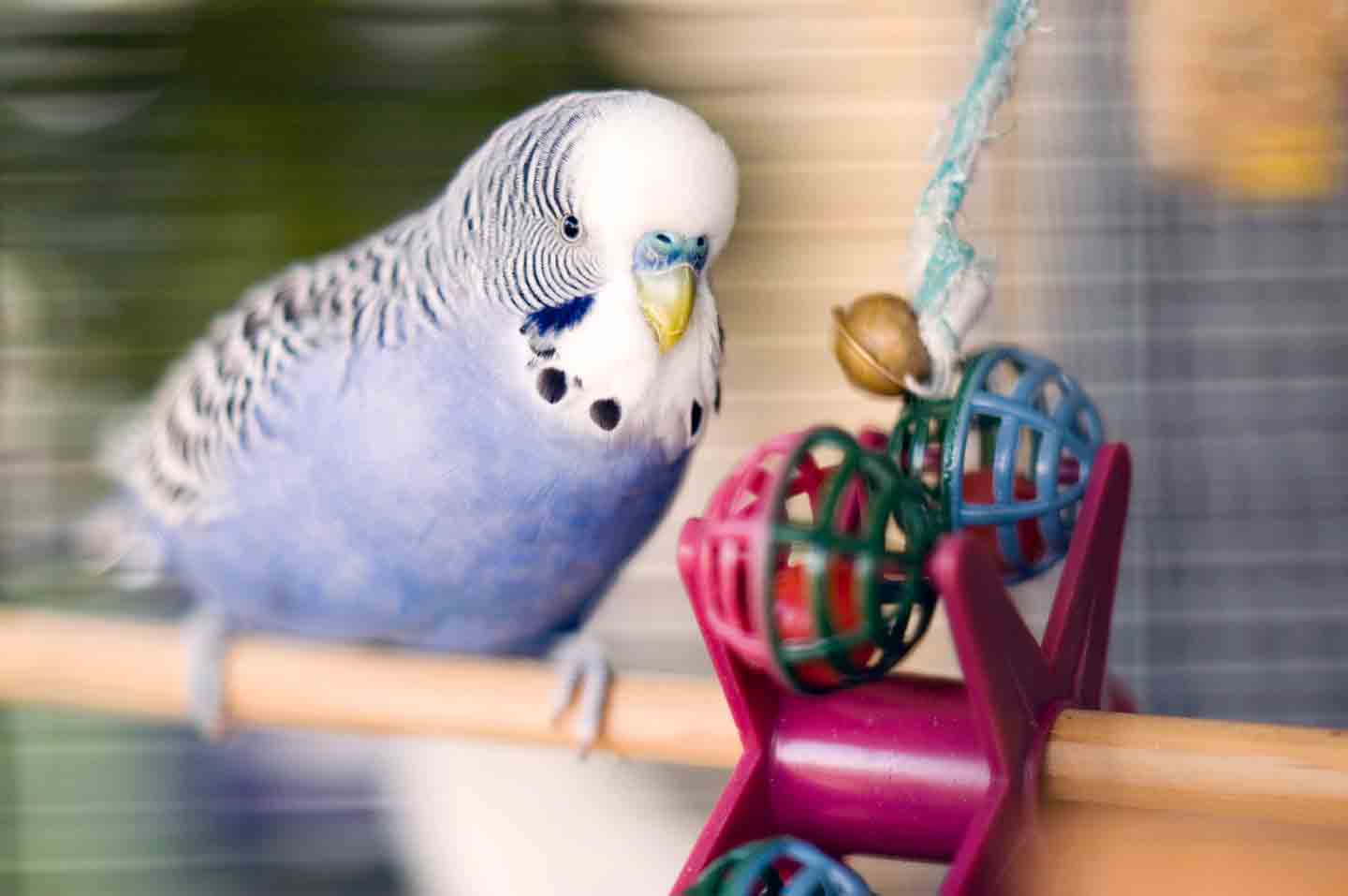
onceawitkin/Getty
Parakeet Behavior
Like any pet, parakeets exhibit both normal and potentially concerning behaviors that may be cause for you to call your vet.
Normal behaviors include:
- Being active
- Perching on branches
- Flying within a safe environment
- Preening
- Engaging in vocalization and socialization with other birds or humans throughout the day
- Foraging for food, including exploring the bottom of the cage
- Playing with toys
Additionally, healthy parakeets should take regular naps—approximately 12 hours at night with one to two additional naps during the day, depending on their activities.
Behaviors that require a call to a veterinarian include:
- Sitting on the perch fluffed and tucking their head behind their wings for more extended periods than usual: While this can be a normal sleeping behavior, if it’s happening for several hours a day or the bird does not rouse and respond attentively when a human tries to interact, then there is cause for concern.
- Signs of respiratory distress: These include open beak breathing or the tail bobbing up and down while perched.
- Leg or wing droop
- Lumps or tumors
- Difficulty walking, climbing or perching
- Beak abnormalities
- Feather plucking
- Regurgitating food or vomiting
- Loose stool or a lack of stool
All of the above may indicate underlying health issues that require professional attention.
Are Parakeets Easy To Take Care Of?
You might be wondering: How high-maintenance are parakeets? About how much time should a bird parent spend with their parakeet each day? And how much money should you expect to spend on caring for your parakeet per year?
Usually, parakeets are moderate in their maintenance level compared to other birds. They’re considered by many to be the “perfect parrot” because they aren’t as high-maintenance as other parrots.
But keep in mind that birds, in general, tend to require lots of social interaction.
Handy tips to keep in mind when caring for a parakeet include:
- Parakeets thrive when offered a healthy, balanced diet that involves foraging to engage them throughout the day.
- Their diet should include a daily component of fresh vegetables or fruits.
- Birds should have access to direct sunlight, preferably not through a window. If that’s not possible, providing daily UVB exposure will enhance their overall mental health.
- It’s best to spend as much time as you can with your parakeet—aim for at least 30 minutes per day. You may consider playing games with your bird!
- Never force your bird to engage in activities with humans if they appear fearful.
- Parakeets should get at least a few hours of undisturbed rest during the day.
You don’t always need to make direct contact with your bird to fulfill their need for attention. Sometimes, simply sitting in the same room and talking to your bird or engaging in your own activities while the bird does their own thing counts as spending quality time together.
Keep birds close to what you consider the activity center of your home so they can feel a sense of social connection.
You should also be aware that parakeets are among the more affordable pets. The estimated cost of food is around $50 to $150 per year. An annual wellness exam by a veterinarian typically costs $75 to $150. Additional expenses may include:
- New perches
- Cage furniture
- Toys
- Veterinary care if the bird develops an illness
In general, it’s best to budget a minimum of $300 per year for parakeet care.
Do Parakeets Need To Be in Pairs?
Since all birds are social animals, it is generally beneficial for them to have a companion. However, humans can serve as companions if they can dedicate enough time to socialize with the parakeet. However, some parakeets may prefer having another bird of the same species as a companion rather than a human.
If you’d like to get your parakeet a friend, it’s ideal to keep them in the same genus. This means that parakeets can live with other parakeets, canaries, finches or other small birds of the Psittacula genus.
However, when mixing any birds, it’s important to observe them to ensure they interact well with one another. It’s also essential to test birds for infectious diseases before introducing them into a flock.
Recommended Products
Parakeet Supplies List
When you keep a parakeet (or any pet, for that matter), there are always those initial one-time purchases as well as supplies you’ll need to buy on a regular basis.
One-time purchases include:
- Bird cage
- Food dishes and water dishes
- Perches
- Toys
- Travel cage or carrier
- A heater or heated perch (optional, for cold climates)
- UV lamp (optional, for birds without access to direct sunlight)
Recurring supplies include:
- Food
- Replacement perches
- Paper substrate
- Replacement toys
We’ve got more details on all of these supplies below.
What Do Parakeets Eat?
Parakeets’ diets should be made up of a mixture of pellets and fresh foods.
Parakeets should generally receive 60–70% of their diet as a formulated diet. The other part should be made up of about 20–30% fresh fruits and veggies, such as:
- Squash
- Leafy greens
- Sweet potatoes
- Peppers
- Carrots
- Apples
- Pears
- Bananas
- Grapes
- Mango
- Papaya
Grains like rice, sorghum, quinoa, spelt, oatmeal and millet can also be included in their diet. Experts suggest that organic ingredients and foods are considered best.
Add some flair to your bird’s diet by including some safe flowers for birds to eat.
And then there are some foods you should never feed to your parakeet. They include:
- Avocados
- Onions
- Garlic
- Macadamia nuts
- Caffeine
- The pits of any fruits
- Apple seeds
- Processed foods designed for human consumption, such as chips, candy and chocolate
- Dairy products
- Meats and eggs
Best Food for Parakeets
Keep these guidelines in mind when choosing food for your parakeet:
- When looking at the nutrition information on a particular bird food, the protein content should be between 6–31%, while the fat content should be around 4–5%. (Note that these recommendations may vary based on factors such as your bird’s age, lifestyle, reproductive status and health status, so be sure to discuss with your veterinarian.)
- It’s best to select a food that’s pelleted only, and not a mix of pellets and seeds/fruits, as birds tend to eat seeds more than pellets if given the choice.
Parakeet Housing
Bird cages come in various sizes, from a single-bird cage to an aviary, so the cost will vary. You will need a cage big enough to allow your parakeet to fly and to stretch their wings.
Recommended Products
What Do Parakeets Need in Their Cage?
- Parakeets require perches of various sizes, shapes and textures. They should be spread throughout the cage at different levels.
- They need access to food and fresh water. Although most parakeet feeding and water bowls are plastic, stainless steel is preferable. Ideally you’ll want to have two water and two food bowls.
- At least three or more enrichment toys should be available. They can be rotated monthly to keep your bird interested.
- Cardboard tubes from paper towel or toilet paper rolls can be put in the cage to satisfy their chewing desire. Untreated North American hardwood branches and small blocks of wood can also be placed on the bottom grate for chewing.
- A bowl of shallow water can be put in the bottom of the cage to allow for bathing.
- Your cage also needs parakeet bedding, such as non-absorbent, paper-based products like paper towels, packing paper or recycled newspaper used to catch droppings (poop) and discarded foods. The papers should be changed out daily to once weekly depending on how soiled they become.
Important note: Never let your bird have access to cloth fabrics, beds or tents to sleep in. Unfortunately, these have led to the death of many small birds due to inappropriate chewing on the fabric and fibers, leading to ingestion.
Recommended Products
You’ll also want to invest in a traveling small cage or carrier for vet visits or any other reason you would leave home with your bird.
Birds need vitamin D as well. Since most windows filter out UV light, bird-specific UV lamps that can attach to the side of the cage are recommended. This is important for the production of vitamin D.
When it comes to the location of your parakeet’s cage, there are a few basic needs that you’ll need to fulfill:
- Mental wellness: Keeping your bird in the center of your house’s activity is great for mental stimulation—but parakeets should also have a quiet place to retreat if needed. Note that it’s not recommended to keep birds in the same airspace as a kitchen due to the potential exposure to toxic fumes from burning food, or Teflon™, which can harm them.
- Temperature: Parakeets require a temperature of around 68–80 degrees F.
- Noise levels: Noise levels can vary from low to high, as parakeets themselves can become loud at times. Sudden, loud claps or bangs may startle them, so preventing these types of sounds is important.
Safety measures to bird-proof a room include:
- Making sure doors and windows are closed
- Ensuring there are no wires that the bird can chew on
- Preventing access to chewing on anything that isn’t wooden or a pre-approved bird toy
- Closing openings to things that contain water such as pots of water, fish tanks or toilet bowls
- Preventing access to small dark corners and cavities that the bird may perceive as a nest and try to get into
- Making sure they don’t have access to any toxic plants
Parakeet Health
At times, parakeets have been found to have certain health problems more commonly than some other birds.
For instance, veterinarians frequently see fatty liver syndrome, a condition that builds up excess fat in the liver, and other liver disorders in parakeets. To avoid these conditions, bird parents can stick to a parakeet diet that’s lower in fat and provides balanced ratios of proteins and other nutrients.
Many parakeets can become obese and suffer from obesity-related diseases, such as heart diseases, high cholesterol, joint pain, and arthritis.
Vets also report seeing cancers more often in parakeets than in other birds. The reason is unknown, but it could be tied to genetics.
To keep your parakeet in good health, you can feed them a diet that’s low in fat, balanced with more variety in the food options offered, preferably including some level of a pelleted diet.
Pet birds should also be housed appropriately, have the ability to exercise and also be kept safe from predators.
Keep in mind that parakeets tend to naturally hide any signs of illness, which is why it’s important to have annual checkups with an avian veterinarian.
How To Hold a Parakeet
Since they’re such small birds, you should be aware that parakeets are fragile and prone to injury. Handle them delicately, as you would a piece of fine porcelain.
Never hold a bird tightly or apply pressure to the keel, the ridge of the breastbone, because birds don’t have a diaphragm and need to move their keel to breathe. Also, never grab a bird’s wings or tail.
How To Train a Parakeet
Our experts share some of their best parakeet-training words of wisdom:
- Positive reinforcement uses a reward that the bird likes to increase the chance of them performing a behavior. Things that may be used as a reward include a seed, a nut or even a head scratch.
- Make sure to be patient. It may take longer for some birds to trust you. Making sure to offer high-value treats whenever interacting with your bird might be essential in developing a good relationship.
- Expect it to take weeks to months, sometimes longer, to tame a parakeet. The easiest to tame are juveniles who have been hand-raised.
- Parakeets are prey animals and take flight when frightened. For anxious birds, going into a small room, turning off the lights and talking softly to the bird is a good way to start bonding.
- The most important command to teach your parakeet is “step up” so that they will grasp your finger and perch. Put your finger out straight and go confidently under its breast. Most will naturally grasp the finger.
- Feed your parakeet treats from your open palm to reduce their fear of hands.
- Give frequent, short lessons rather than one long session.
- Never punish or frighten your bird.
How To Get a Parakeet To Trust You
A bond can be strengthened between a human and their bird by being calm, kind and understanding. Never push a bird to do something.
Instead, always ask a bird to do something, and if they don’t want to, respect that. Birds signal to us when they don’t want to do something, and people need to be on the lookout for these signals.
In general, look for the clues your bird gives you with their body postures, feather placement and eye changes to understand what they’re saying.
Most of the time, birds will give many of these signals first before they are pushed to their limit and choose to bite as a way to get people to go away. Learn their signals, respect their signals and then you will build trust.
Lastly, be calm and gentle. Talk in a soft, sweet way and offer high-value treats to win your bird’s trust.
FAQs About Parakeets
Are parakeets good pets?
How big do parakeets get?
How much are parakeets?
Expert input for this story provided by: Stephanie Lamb, DVM, DABVP (Avian Practice) at Arizona Exotic Animal Hospital in Mesa, Phoenix and Tucson, Arizona; Alisa Rassin, VMD, founder and medical director of the Exotic Animal Hospital of Philadelphia in Philadelphia, Pennsylvania; and Dr. Heide Meier at Truesdell Animal Care Hospital and Clinic in Madison, Wisconsin.
